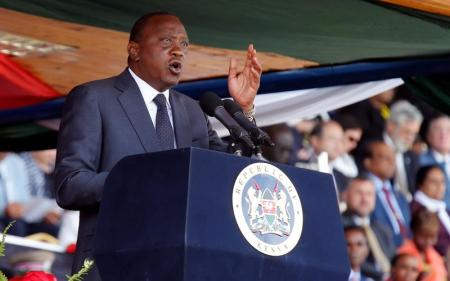
By Edmund Blair
NAIROBI (Reuters) – Kenyan President Uhuru Kenyatta approved a law on Monday requiring back up plans for an August election if electronic voting systems fail, despite fierce opposition from rivals who say any manual arrangements will open the ballot to rigging.
Veteran opposition leader Raila Odinga disputed the result of the 2013 race, which he lost to Kenyatta after electronic voter identification and other election systems collapsed. He has led opposition to the new law.
The build-up to the 2017 vote has already been marred by protests and clashes with police that led to at least four deaths. Last year’s demonstrations were sparked by a row over who sat on a committee overseeing the conduct of the election. The government agreed to replace the commissioners in a deal with the opposition.
Odinga has tried and failed to win the presidency in three previous elections, including in 2013 and 2007 when Odinga said the poll was rigged and about 1,200 people were killed in ethnic fuelled violence.
The presidential office said in a statement that Kenyatta had “assented to the Elections Laws (Amendment) Bill 2016 that allows a back-up mechanism to the electronic voting method.”
This allows the electoral oversight committee to put in place “a complementary mechanism for identification of voters and transmission of elections results” if electronic voting fails.
It did not specifically mention a “manual” system, but the statement said any complementary arrangement had to be “simple, accurate, verifiable, secure, accountable and transparent.”
The opposition has said the use of manual systems in past votes was used to rig voting lists and other aspects of elections. It has warned of “mass action” if a manual system is used again, without specifying what that would entail.
Opposition politicians have planned a meeting on Wednesday to discuss what steps to take over the law.
The government has promised a free and fair vote, and has dismissed charges of abuses in previous votes.
(Additional reporting by George Obulutsa and Humphrey Malalo; editing by Richard Lough)

